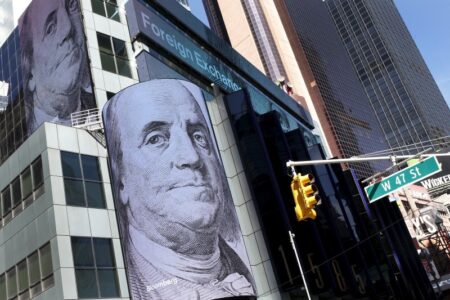© Reuters. FILE PHOTO: People gather to board a truck to get away outside Khartoum, during clashes between the paramilitary Rapid Support Forces and the army, in Khartoum, Sudan, April 28, 2023.
2/3
By Khalid Abdelaziz, Sarah El Safty and Nafisa Eltahir
KHARTOUM/CAIRO (Reuters) – The conflict rocking Sudan has dealt a crushing blow to the country’s economy in the capital Khartoum, disrupting internal trade routes, threatening imports and causing a liquidity crisis.
Across large areas, major factories, banks, shops and markets have been looted or damaged, electricity and water supplies have been disrupted, and residents have reported sharp price hikes and shortages of basic commodities.
Even before the outbreak of fighting between military factions on April 15, Sudan’s economy was in a deep recession after a crisis that stretched back to the last years of Omar al-Bashir’s rule and turmoil after his ouster in 2019.
Tens of thousands have now fled the violence in Khartoum and the sister cities of Bahri and Omdurman, while millions more have taken refuge in their homes as shelling and air strikes spread through neighbourhoods.
The movement of goods and people has slowed as troops and sometimes gangs roam the streets. Communications networks are becoming unreliable and some say they are starting to ration food and water.
Ismail al-Hassan, an employee of a company in Khartoum, said, “We are afraid and suffer from high prices and shortages and shortages in salaries. This is a war on the citizen.”
Sudan, which is already a significant exporter of gum arabic, sesame, peanuts and livestock, has the potential to be a major agricultural and livestock exporter and logistics hub.
But the economy has been hampered by decades of sanctions and international isolation, as well as endemic corruption. Most Sudanese have suffered from years of rampant inflation, sharp currency depreciation, and deteriorating living standards. About a third of the population of 46 million people depend on humanitarian aid.
There are no drivers
The conflict has hampered trade flows to and from the east African country, because banking and customs procedures are centralized in Khartoum. While the country’s main port on the Red Sea is operating, at least one major shipping company, Maersk, says it has stopped taking bookings until further notice.
A Khartoum-based trader said wheat imports, key to Sudan’s food security, are becoming more difficult. Imports of white goods such as refrigerators across the land border with Egypt, where tens of thousands of Sudanese have fled north, have also slowed, said Alaa Ezz, secretary-general of the Federation of Egyptian Chambers of Commerce.
Michel Sidhom, a supply chain manager for a trading company operating in Egypt and Sudan, said that its business in Sudan has “completely stopped” with the cessation of Egyptian fertilizer and flour exports, which usually amount to about 10,000 tons per month each.
Egypt, Sudan’s second-largest destination for livestock, one of its main exports, said it was looking to diversify its sources as a result of the unrest.
Their master says his company’s merchants in the Sudan have left Khartoum, and no drivers are willing to risk taking their goods to the capital.
“They closed and left Khartoum until further notice. Whoever stays in Khartoum remains on a battlefield,” he said.
Scarcity and high prices
Shortages of some items such as flour and vegetables have been reported in Khartoum, along with price hikes. Long lines in front of bakeries and supermarkets in the capital.
The price of one kilogram of lamb jumped by about 30% to 4,500 pounds ($7.52), according to a Reuters correspondent, while the price of a kilogram of tomatoes doubled to one thousand pounds ($1.67).
A supermarket owner in Omdurman blamed the inflation on high fuel prices on the black market. A gallon of the scarce fuel can now cost 40,000 pounds ($67), up from 2,000 pounds ($3.34).
A butcher in Omdurman said demand is low even in places where fighting has eased. He said, “Everyone stayed.”
The Sudanese pound has lost about 600 percent against the dollar since 2018, prompting many to save money in dollars.
Merchants in Khartoum are facing a cash crunch, and people are increasingly relying on an e-wallet app known as Bankak, which often suffers outages, to pay bills.
The black market has become distorted, as relatives abroad seek to sell dollars for pancak remittances, while residents in the country seek dollars for safekeeping.
Currency dealers offer dollars at rates as high as 700 Egyptian pounds ($1.17), while buying at as low as 300 Egyptian pounds ($0.5014), with rates varying widely as transportation and communication becomes more difficult.
The Central Bank of Sudan said on Sunday that banks outside the capital were conducting deposit and withdrawal transactions. Inside Khartoum, the army and the RSF accused each other of looting banks. The head of a bank in Khartoum said he was trying to move the bank’s headquarters temporarily outside the capital.
Another executive said that in the years of economic reforms, coups and protests, “this is the biggest challenge facing the banking system, and it threatens an almost complete closure,” he said.
Crowds were seen in the city of Atbara, northeast of Khartoum, outside banks, some of which restricted withdrawals.
“I ran out of money because I did not receive my salary and the banking applications are not working,” Al-Hassan said, speaking from Khartoum.
($1 = 598.2002 Sudanese pounds)
